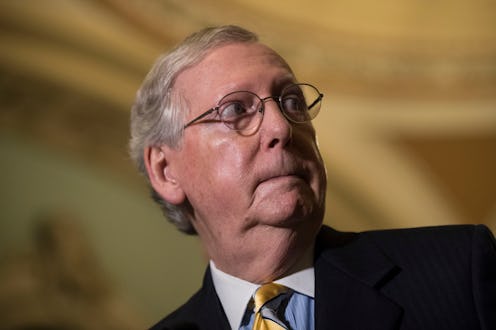News
How Republicans Are Their Own Worst Enemy On Health Care

On Wednesday, a NPR/PBS NewsHour/Marist poll revealed just how toxic passing the new Senate health care bill could be for Republicans. Only 17 percent of Americans approve of the bill, a tough pill to swallow for the repeal and replace camp. But the majority of Senate Republicans are still pledging their support for the deeply unpopular legislation — and perversely, it may be to make sure fellow party members don't make a grab for their jobs come 2018.
Republican Senate Majority Leader Mitch McConnell announced on Tuesday that the Senate would delay the vote on its version of the health care bill until after the July 4th recess. Caitlin Legacki, director of communications at political consulting firm Precision Strategies, says that it's hard for the timing to be worse for Republicans. Now, these senators have to go back to their home states — and they are almost certainly going to get an earful from constituents.
"If they had managed to get the bill passed this week, I think it would’ve been much less scary for a lot of Republicans, because they didn’t have to go home and hear about it until after the vote was over," Legacki tells Bustle. "But now you’re looking at a lot of moderate Republicans. A lot of Republicans who have been on the fence, they're going to have to host town halls. They're going to have to go shopping at their local grocery store. I guarantee they're going to hear about this wherever they go."
So with mounting political opposition and public opinion overwhelmingly stacked against them, why should Republican senators even bother salvaging this bill? The answer may lie in elections — but not against Democrats. Friendly fire in the primaries could be a much bigger concern if these Republicans fail to repeal and replace the Affordable Care Act (aka Obamacare).
I think the reality is that a lot of these guys campaigned on repeal and replace for the last seven years, and they’re more afraid of facing a primary challenge for failing to keep that promise, than they are about the actual consequences that this will have on human life.
McConnell, who hails from Kentucky, won reelection to his seat in 2014 by 15.5 percentage points. And while that race was predicted to be much closer, the real danger to McConnell that year lay in the primaries. In fact, he was one of National Journal's top five incumbent senators at risk of being unseated in the primary. Among the Republican senators reportedly involved in crafting the bill, the majority won their last election handily over Democrats, according to Ballotpedia. Eleven won the race by more than 15 percentage points, and six by 30 or more points. The biggest margins went to Wyoming Sens. Mike Enzi and John Barrasso, both with a roughly 54-point spread between them and their next-highest-ranking competitor. They are most likely not as concerned about which Democrat they will face in their general elections as which Republican candidates they will face in the primaries.
“It does defy logic in many ways, that a bill that is universally unpopular would get as many 'yes' votes as it will,” Legacki says. “I think the reality is that a lot of these guys campaigned on repeal and replace for the last seven years, and they’re more afraid of facing a primary challenge for failing to keep that promise than they are about the actual consequences that this will have on human life.”